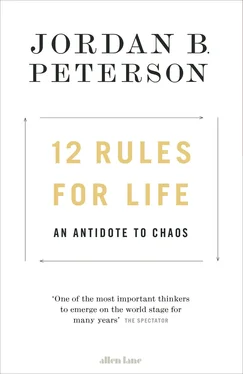This means that the damage caused by the bullying (the lowering of status and confidence) can continue, even after the bullying has ended. [18025] Olweus, D. (1993). Bullying at school: What we know and what we can do . New York: Wiley-Blackwell.
In the simplest of cases, the formerly lowly persons have matured and moved to new and more successful places in their lives. But they don’t fully notice. Their now-counterproductive physiological adaptations to earlier reality remain, and they are more stressed and uncertain than is necessary. In more complex cases, a habitual assumption of subordination renders the person more stressed and uncertain than necessary, and their habitually submissive posturing continues to attract genuine negative attention from one or more of the fewer and generally less successful bullies still extant in the adult world. In such situations, the psychological consequence of the previous bullying increases the likelihood of continued bullying in the present (even though, strictly speaking, it wouldn’t have to, because of maturation, or geographical relocation, or continued education, or improvement in objective status).
Sometimes people are bullied because they can’t fight back. This can happen to people who are weaker, physically, than their opponents. This is one of the most common reasons for the bullying experienced by children. Even the toughest of six-year-olds is no match for someone who is nine. A lot of that power differential disappears in adulthood, however, with the rough stabilization and matching of physical size (with the exception of that pertaining to men and women, with the former typically larger and stronger, particularly in the upper body) as well as the increased penalties generally applied in adulthood to those who insist upon continuing with physical intimidation.
But just as often, people are bullied because they won’t fight back. This happens not infrequently to people who are by temperament compassionate and self-sacrificing—particularly if they are also high in negative emotion, and make a lot of gratifying noises of suffering when someone sadistic confronts them (children who cry more easily, for example, are more frequently bullied). [18026] Ibid.
It also happens to people who have decided, for one reason or another, that all forms of aggression, including even feelings of anger, are morally wrong. I have seen people with a particularly acute sensitivity to petty tyranny and over-aggressive competitiveness restrict within themselves all the emotions that might give rise to such things. Often they are people whose fathers who were excessively angry and controlling. Psychological forces are never unidimensional in their value, however, and the truly appalling potential of anger and aggression to produce cruelty and mayhem are balanced by the ability of those primordial forces to push back against oppression, speak truth, and motivate resolute movement forward in times of strife, uncertainty and danger.
With their capacity for aggression strait-jacketed within a too-narrow morality, those who are only or merely compassionate and self-sacrificing (and naïve and exploitable) cannot call forth the genuinely righteous and appropriately self-protective anger necessary to defend themselves. If you can bite, you generally don’t have to . When skillfully integrated, the ability to respond with aggression and violence decreases rather than increases the probability that actual aggression will become necessary. If you say no, early in the cycle of oppression, and you mean what you say (which means you state your refusal in no uncertain terms and stand behind it) then the scope for oppression on the part of oppressor will remain properly bounded and limited. The forces of tyranny expand inexorably to fill the space made available for their existence. People who refuse to muster appropriately self-protective territorial responses are laid open to exploitation as much as those who genuinely can’t stand up for their own rights because of a more essential inability or a true imbalance in power.
Naive, harmless people usually guide their perceptions and actions with a few simple axioms: people are basically good; no one really wants to hurt anyone else; the threat (and, certainly, the use) of force, physical or otherwise, is wrong. These axioms collapse, or worse, in the presence of individuals who are genuinely malevolent. [18027] Janoff-Bulman, R. (1992). Shattered assumptions: Towards a new psychology of trauma . New York: The Free Press.
Worse means that naive beliefs can become a positive invitation to abuse, because those who aim to harm have become specialized to prey on people who think precisely such things. Under such conditions, the axioms of harmlessness must be retooled. In my clinical practice I often draw the attention of my clients who think that good people never become angry to the stark realities of their own resentments.
No one likes to be pushed around, but people often put up with it for too long. So, I get them to see their resentment, first, as anger, and then as an indication that something needs to be said, if not done (not least because honesty demands it). Then I get them to see such action as part of the force that holds tyranny at bay—at the social level, as much as the individual. Many bureaucracies have petty authoritarians within them, generating unnecessary rules and procedures simply to express and cement power. Such people produce powerful undercurrents of resentment around them which, if expressed, would limit their expression of pathological power. It is in this manner that the willingness of the individual to stand up for him or herself protects everyone from the corruption of society.
When naive people discover the capacity for anger within themselves, they are shocked, sometimes severely. A profound example of that can be found in the susceptibility of new soldiers to post-traumatic stress disorder, which often occurs because of something they watch themselves doing, rather than because of something that has happened to them. They react like the monsters they can truly be in extreme battlefield conditions, and the revelation of that capacity undoes their world. And no wonder. Perhaps they assumed that all of history’s terrible perpetrators were people totally unlike themselves. Perhaps they were never able to see within themselves the capacity for oppression and bullying (and perhaps not their capacity for assertion and success, as well). I have had clients who were terrified into literally years of daily hysterical convulsions by the sheer look of malevolence on their attackers’ faces. Such individuals typically come from hyper-sheltered families, where nothing terrible is allowed to exist, and everything is fairyland wonderful (or else).
When the wakening occurs—when once-naïve people recognize in themselves the seeds of evil and monstrosity, and see themselves as dangerous (at least potentially) their fear decreases. They develop more self-respect. Then, perhaps, they begin to resist oppression. They see that they have the ability to withstand, because they are terrible too. They see they can and must stand up, because they begin to understand how genuinely monstrous they will become, otherwise, feeding on their resentment, transforming it into the most destructive of wishes. To say it again: There is very little difference between the capacity for mayhem and destruction, integrated, and strength of character. This is one of the most difficult lessons of life.
Maybe you are a loser. And maybe you’re not—but if you are, you don’t have to continue in that mode. Maybe you just have a bad habit. Maybe you’re even just a collection of bad habits. Nonetheless, even if you came by your poor posture honestly—even if you were unpopular or bullied at home or in grade school [18028] Weisfeld, G. E., & Beresford, J. M. (1982). “Erectness of posture as an indicator of dominance or success in humans.” Motivation and Emotion, 6 , 113–131.
—it’s not necessarily appropriate now. Circumstances change. If you slump around, with the same bearing that characterizes a defeated lobster, people will assign you a lower status, and the old counter that you share with crustaceans, sitting at the very base of your brain, will assign you a low dominance number. Then your brain will not produce as much serotonin. This will make you less happy, and more anxious and sad, and more likely to back down when you should stand up for yourself. It will also decrease the probability that you will get to live in a good neighbourhood, have access to the highest quality resources, and obtain a healthy, desirable mate. It will render you more likely to abuse cocaine and alcohol, as you live for the present in a world full of uncertain futures. It will increase your susceptibility to heart disease, cancer and dementia. All in all, it’s just not good.
Читать дальше












